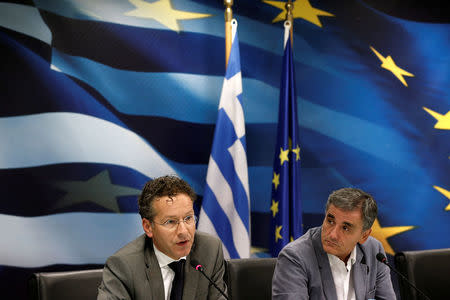Greece must wrap up review rapidly to start talks on bailout exit - Dijsselbloem
By Lefteris Papadimas and Angeliki Koutantou ATHENS (Reuters) - Greece must wrap up an upcoming bailout review quickly to pave the way for a "clean" bailout exit next summer without further conditions beyond standard monitoring, Eurogroup Chairman Jeroen Dijsselbloem said on Monday. After seven years of austerity and rescue loans amounting to about 270 billion euros ($320 billion), Greece hopes its third, 86 billion-euro bailout will also be its last. Greece too wants a so-called clean exit in August 2018. "We are in full agreement for that -- it should be a clean exit, Greece should become financially independent again and be able take its own political decisions for the future within the family of the Eurogroup," Dijsselbloem said in a visit to Athens. "There are no further conditions at the end of the programme, no further restrictions," he said after meeting Greek Finance Minister Euclid Tsakalotos. Once Greece exits the bailout, it would be monitored by the European Stability Mechanism, a "standard procedure" in place for other member states which also emerged from bailouts, he said. But Dijsselbloem cautioned that Greece was not yet out of the woods, and would need more reforms in the coming years. The euro zone would look into granting it further debt relief. On the stance of Germany, Greece's main creditor, a day after Angela Merkel secured a fourth term as chancellor, he said that he did not expect Germany's position to change in Greek bailout negotiations. "I don't think the German elections will make a lot of difference," he said. BACK ON TRACK Dijsselbloem last visited Athens in 2015, when Greece's leftist-led government clashed with its foreign creditors over the terms of its bailout and teetered on the verge of financial collapse. Greece was now "coming back on track," Dijsselbloem said on Monday, and called on both Athens and its foreign creditors to work towards ensuring the country can stand on its feet. "The end of the programme is the beginning of a new phase and we should do whatever we can ... to make sure that Greece is fully prepared for financial independence," Dijsselbloem said. But for talks to begin on how Greece can exit its bailout, Athens must conclude a third review of progress made under its programme by the end of this year, he said. As Greece moves towards the end of the bailout, it was also important to establish that Greek banks were "stable and strong," Dijsselbloem said in an interview with Greek Ska TV. It was up to banking authorities, and chiefly the European Central Bank, to decide how to assess them, he said. "If that can be done with the stress test, that's fine. If it requires an AQR (asset quality review), so be it." A source told Reuters on Monday that the ECB may bring forward its stress test of Greek banks next year to ensure there would be plenty of time before the bailout ends to re-capitalize banks, should the exercise uncover any capital shortfall. In meetings with Prime Minister Alexis Tsipras and President Prokopis Pavlopoulos, Dijsselbloem said he would support Greece's efforts to speed up the review, which is expected to begin next month, until his term expires in January. "In the months that I have, make no mistake that I will be fully committed," he said. Greece's second review took more than six months to be completed, often due to disagreements on the country's fiscal targets, on debt relief, and reforms. "The review is now the next step. It can and should be done before the end of the year," he said. (Additional reporting by Angeliki Koutantou, Karolina Tagaris and George Georgiopoulos)

 Yahoo Finance
Yahoo Finance 

